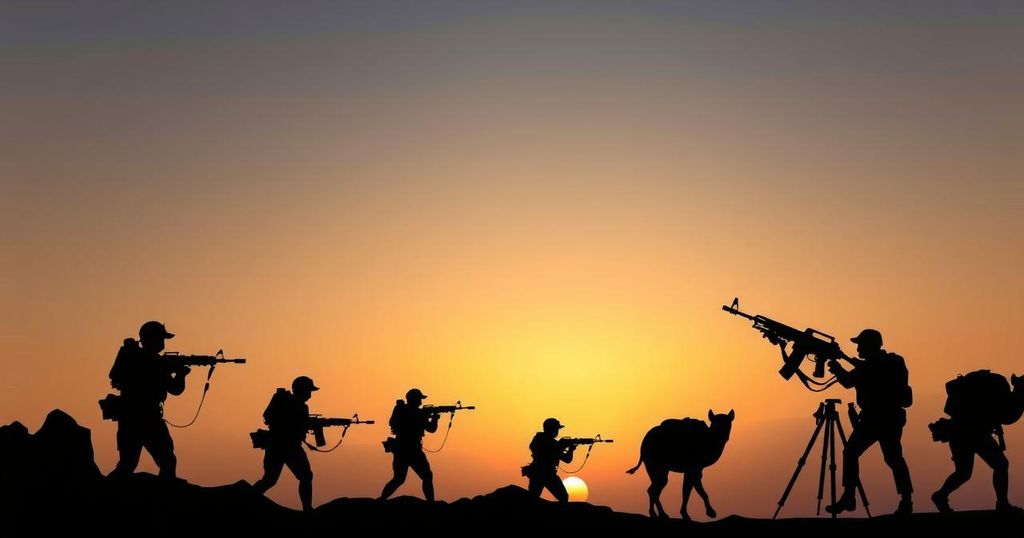Escalating Arms Race: Egypt and Ethiopia’s Proxy Battle in Somalia

The arms race between Egypt and Ethiopia in Somalia is intensifying due to their longstanding disputes over the Nile. Somalia claims sovereignty over military aid on its soil, which Ethiopia views as a threat given its alliance with Egypt. Both nations have been shipping arms, raising concerns over regional stability, particularly regarding the militant group al-Shabaab. Political tensions are further heightened by Ethiopia’s military presence in Puntland and its agreements with Somaliland, fostering a complex situation amid Somalia’s ongoing struggles for internal cohesion and security.
The longstanding rivalry between Egypt and Ethiopia over the Nile River has intensified, manifesting in an arms race within Somalia. Somalia has asserted its sovereign rights in determining the influx of arms and foreign military presence on its territory. This has raised alarms in Ethiopia, particularly as Somalia aligns itself with Egypt, historically perceived as a foe of Addis Ababa. Although both nations have yet to engage in direct conflict, their tensions have escalated into an arms race, catalyzed by recent developments including Egypt’s shipment of military aid to Somalia aimed at fortifying the Somali army. Ethiopia, which already has troops engaged in security operations in Somalia, contested these shipments, alleging that such actions could exacerbate instability and bolster the activities of the militant group al-Shabaab. Ethiopian officials have expressed concerns regarding the implications of Egyptian heavy weapon deliveries, suggesting they could escalate violence in the region. In contrast, the Somali Foreign Affairs Minister purported that Ethiopia was attempting to distract from its own arms provision to Puntland, warning that this could inadvertently empower terrorist factions. The escalating situation is compounded by Ethiopia’s recent military agreements with Somaliland, which Somalia views as a direct affront to its national sovereignty. As political tensions rise, Somalia has sought to exclude Ethiopia from upcoming military collaborations with the African Union. Ethiopia contends that it is unjustly criticized despite its sacrifices for regional security. The Somali President has firmly stated that normalization of relations hinges on Ethiopia renouncing its agreements with Somaliland, highlighting the intricate interplay of political stability and security in the region. Meanwhile, Puntland’s autonomy and its possible future dealings reflect the complexities of governance within Somalia. As the dynamics continue to evolve, the implications of these developments could significantly impact not only bilateral relations but also broader regional security efforts against terrorism.
The article discusses the escalating tensions between Egypt and Ethiopia concerning their historical rivalry over the Nile River, which has now spilled into an arms race in Somalia. Somalia is positioned in a precarious situation, asserting its sovereignty while navigating relationships with both nations, which are vying for influence in the region. The involvement of foreign arms and military assistance complicates Somalia’s security landscape, particularly in the context of ongoing threats from al-Shabaab and the internal governance challenges that Somalia faces. The dynamics are further complicated by Ethiopia’s military agreements with Somaliland, which Somalia considers a breach of its territorial integrity.
In conclusion, the arms race between Egypt and Ethiopia in Somalia not only threatens the fragile security landscape of the region but also highlights the delicate balance of sovereignty, influence, and security cooperation. As both nations vie for supremacy, the ramifications of their actions could hinder collective efforts to combat terrorism and destabilize the existing political fabric within Somalia. The leadership in Mogadishu must navigate these challenges carefully to maintain its sovereignty and security in the face of external pressures.
Original Source: nation.africa








